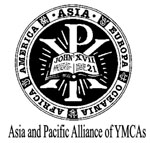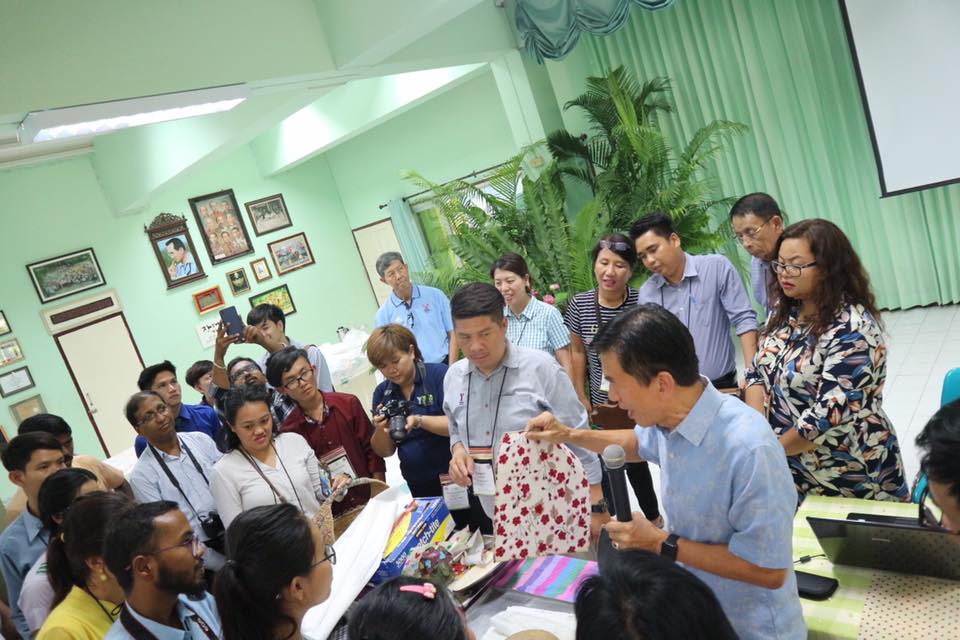 |
| ↑ Dr. Sintunawa explains the use of wax cloth
|
The participants had visited the Saohin YMCA Energy Learning Center to learn more about energy conservation, renewable energy and also food processing with the use of solar energy.
One of the important segments of the training was to understand the concept of carbon emissions, greenhouse gases and calculation of carbon footprints. The participants were taught how to calculation of carbon emissions in their daily life, and their respective YMCAs or organizations they came from.
The carbon absorption capacity and the carbon content of plants and trees were widely discussed. It was understood that only when a tree is matured enough like 40 years old with sizeable width and height, only then it attains the capacity to absorb carbon oxide through the photosynthesis process in the vicinity of a metric ton per year. Usually a young tree absorbs only 20 kilograms of carbon dioxide per year on an average. So it is more important to take care of trees and protect the tree until it is matured enough, then to simple plant trees.
As a part of the field visit, the members visited Ban Pabuk Maerang Municipality in the Lampung Province, this was a unique village which has a track record of zero waste village. Non bio-degradable waste were turned into compost manure and the rest were recycled in various ways for reuse. Even the styrofoam from the packaging materials were recycled by using them as a component of concrete blocks in a certain proportion, making the blocks weigh lighter.
The participants had the opportunity to follow a trail through the Dou Se Thep mountain, studying the local ecosystem and also study the watershed area and how the flow of water in the mountain streams was disrupted in various places affecting the natural flow of water thus causing hindrances to the natural habitat of flora and fauna.
On the final day the participants contemplated and prioritized their focus on three main issues according to their understanding, which were (i) lack of environmental awareness among the people, (ii) waste problem and (iii) pollution.
The participants had simple and realistic action plans to follow up when they return to their home, like using re-usuable water bottles, and no use of plastic bottles. Reduce electricity consumption of in their organizations and home. Write or print both sides of papers and also then use it for braille printing. Plant trees in apartments, hills, mangrove areas to increase green area. Introduce eco-bags instead of plastic bags, and make promotional videos for this purpose. Reduce waste drastically. Educate YMCA staff on environmental awareness. Organize Zero Burning Campaign, and do not burn tree leaves but make them compost manures. Use more LED lights instead of conventional lights and form Green Teams in the YMCAs.
At the closing ceremony each of the participants pledged a personal commitment in changing their behavioral patterns in order to protect the environment. The participants were awarded with course completion certificates.
We want to make a special note of thanks to Mr. Colin Lambie, Y’s Men Australia and Ms. Patcharin Aviphan, Director of Sao Hin YMCA and Mr. Narupacha Muang-In, Assistant Director of Sao Hin YMCA for their whole hearted support to make this training a great success.
Mr. Duncan Chowdhury and Ms. Cristina Miranda, Executive Secretaries of APAY also acted as facilitators at Green Ambassadors Training Program.
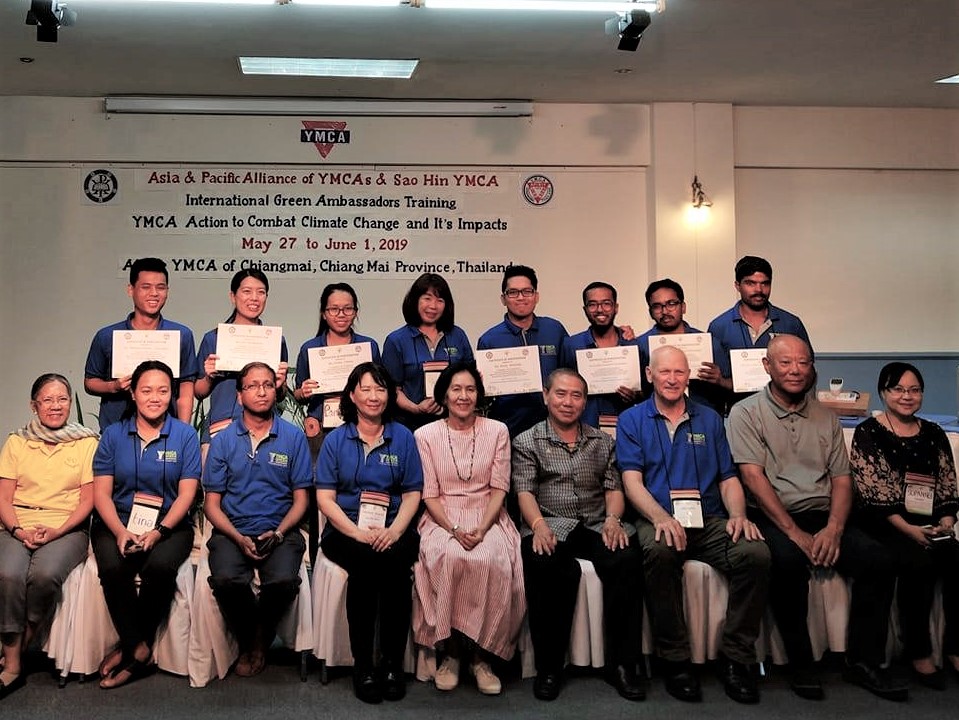 |
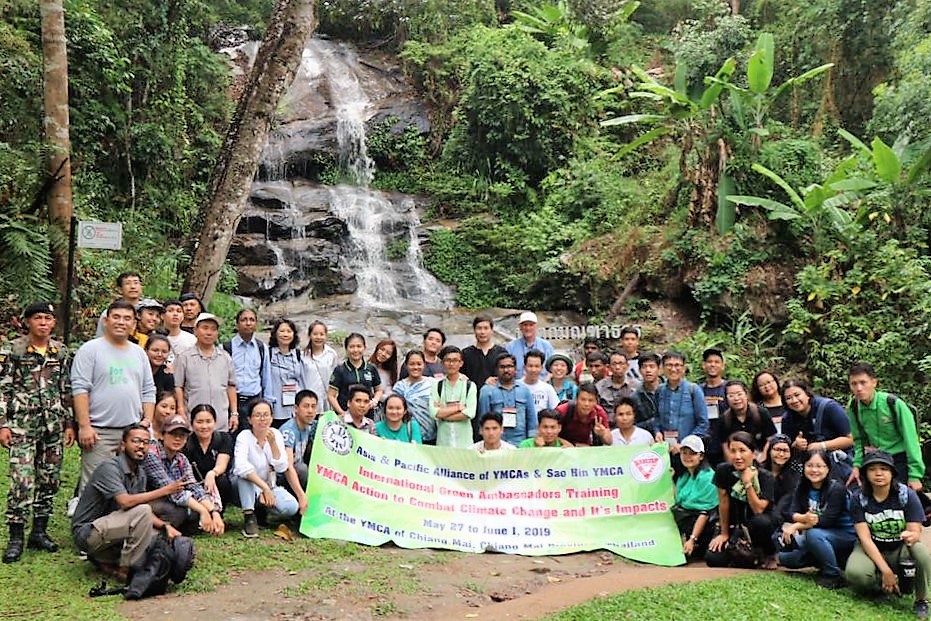 |
| ↑ Participants of Green Ambassadors Training
|
↑ Group Photo of the Green Ambassadors Training
|
~ Duncan Chowdhury, Executive Secretary
ICF Visit Bangladesh YMCA
The National Forum of Bangladesh of the Interfaith Cooperation Forum held its Follow-Up activity at the Matthew Malaker Conference Hall of YMCA Training Center at Savar, Dhaka, Bangladesh on 24th and 25th of May 2019. Out of the eleven ICF alumni, seven were present, two of whom are women. There were a total of fourteen (14) participants who came for the workshop including some YMCA staff. The activities during the first day, May 24, 2019, included program orientation and greetings from the Nipun Sangma, NGS of NCY-Bangladesh and also from APAY and ICF, and sharing of alumni involvements in interfaith efforts for peace. Duncan Chowdhury explained the history of the emergence of ICF within the context of Asia. Muriel Orevillo-Montenegro shared the coverage of ICF work. She also introduced very briefly only one principle of Nonviolent Communication (NVC) as time was very limited.
On the second day, the couple, Mervyn and Kirstin De Mello facilitated the workshop on peace-building. They started with brainstorming on the definition of peace, and proceeded to several workshops with a focus on the basic questions, namely: what/who are the forces against peace in the family, educational institutions and communities? What/who are the forces for peace in the family, educational institutions, and communities? Through a story of a composite character, the participants discussed and reflected on the cycle of violence that happens to a person, family and communities, and how to find a way out of such vicious cycle.
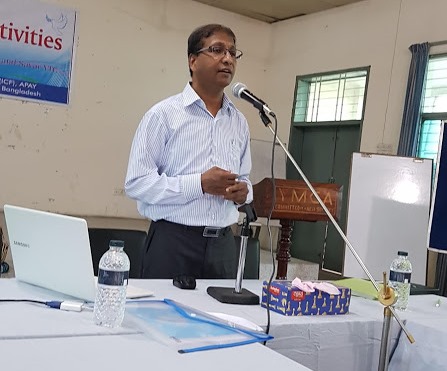 |
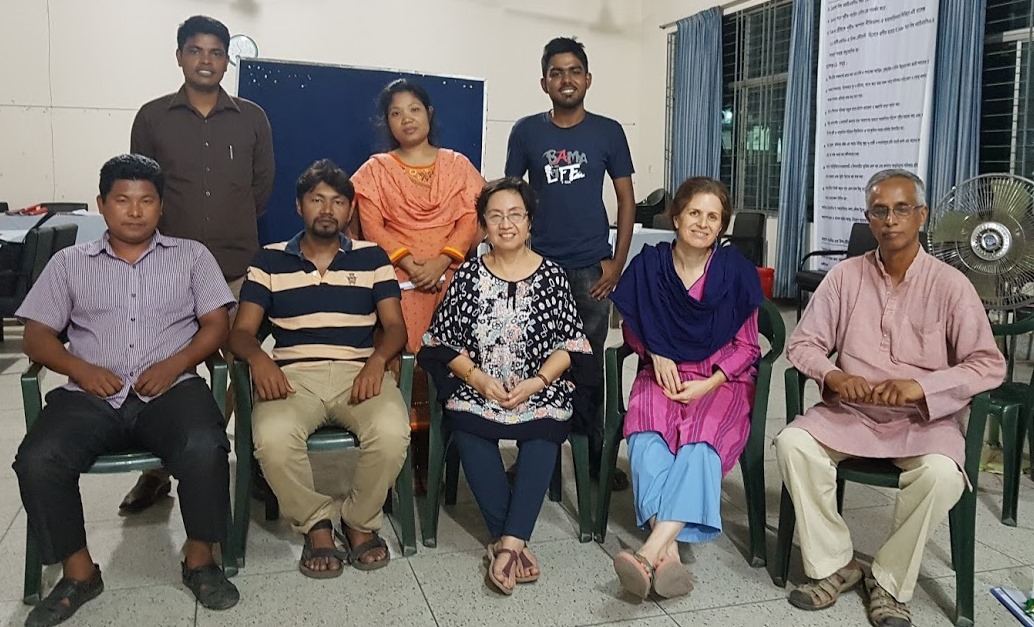 |
| ↑ Duncan explains how ICF became a project of YMCA |
↑ Small group photo with facilitators Kirstin and Mervin De Mello |
Orevillo-Montenegro then introduced the theory of change. She asked the Bangladesh National Forum to formulate its theory of change as a basis for brainstorming and planning for its future task. Some notes on the theory and on some plans were made. The National Forum also decided to appoint Nichodemus D’Costa as acting-Coordinator of the National Forum while Mabhuva Moni Parvin is unable to carry out her task as Coordinator due to her delicate pregnancy.
Prior to the workshop, on May 22, 2019, Duncan, Muriel and Biplob took the four-hour trip to visit the YMCA Edilpur, where Sabbir Talukdar, School of Peace 2018 alumnus serves as a volunteer. The General Secretary of Edilpur YMCA, Bappu Mree, who was also an alumnus of a mini-SoP program in the past, welcomed the APAY and ICF personnel warmly. The participants of the YMCA literacy program for women and children prepared a program for the group. In the evening, the APAY President, Babu Gomes graciously hosted the dinner at Dhaka in the presence of Nipun Sangma NGS and the Immediate Past President of NCY – Bangladesh, Raymond Areng, who was also a mini-SoP alumnus.
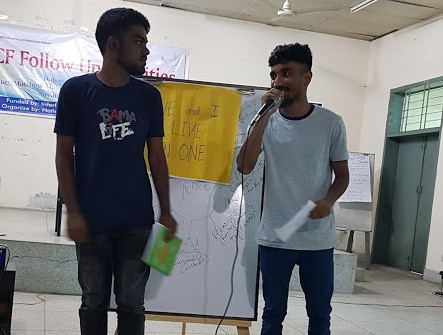 |
| ↑ Sabbir and Raja of SOP 2018 leading energizers
|
In the morning of the following day, May 23, 2019, ICF Coordinator Muriel Orevillo-Montenegro discussed with the Bangladesh YMCA the logistical issues for hosting of the School of Peace 2019 at Dhaka, Bangladesh. Duncan Chowdhury and Muriel Orevillo-Montenegro met with NGS and staff of NCY Bangladesh to discuss the program and preparations for the School of Peace 2019.
Biplob Rangsa, a School of Peace alumnus and the Executive Secretary of NCY - Bangladesh coordinated the whole affair.
~ Muriel Orevillo-Montenegro, ICF Coordinator
Solidarity visit to Sri Lanka YMCAs and Churches
A joint visit to Sri Lanka YMCA and churches were made by by Carlos Sanvee, SG of World Alliance and Nam Boo Won, GS of APAY with the purpose to express World YMCA family’s condolence to the victims as well as sympathy and solidarity to the families, churches and people at large deeply affected by the brutal terrorist bomb attacks in the Easter Sunday. Dr. Muriel Montenegro, Coordinator of Inter-faith Cooperation Forum (ICF) was accompanied to this visit with a view to exploring urgent action programs for inter-faith peace-building in Sri Lanka, particularly with the alumni of the ICF programs such as the School of Peace. From Sri Lanka YMCA, Mr. Nirmal Fonseka, President, Mr. Charles Brownson, NGS, Mr. Kishan Gunawardene, APAY Vice President, Mr. Felician Francis, former President were also accompanied in this visit.
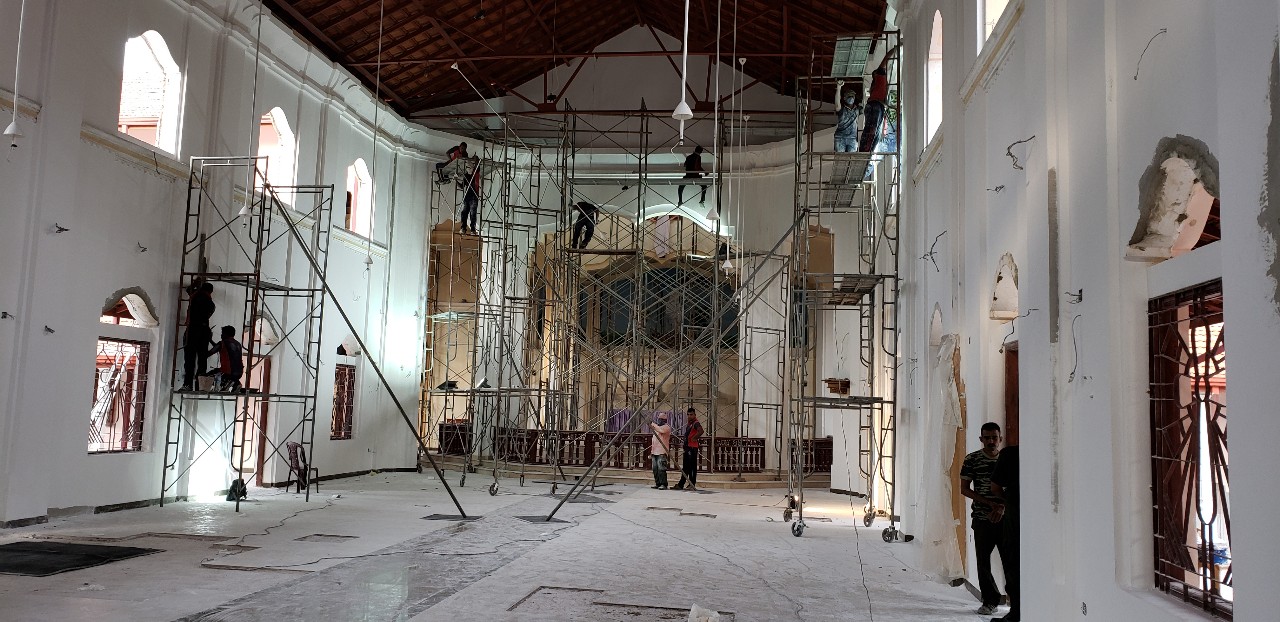
|
| ↑ St. Sebastian's Church where scores of believers' life were taken by the Easter Sunday brutal attack
|
During the three days intensive schedule of solidarity visit from 29th to 31st May in Sri Lanka, the delegation, together with key leaders of the Sri Lanka YMCA, met with Most Revd. Dr. Maxwell Silva, Auxiliary Bishop of the Catholic Church in Sri Lanka, expressing world YMCA’s deeply sympathy for the victims of the attack and exploring ways in which the YMCA could collaborate with the churches on inter-faith peace-building in the country. Thereafter, we paid a visit to St. Sebastian’s Church, Katuwapitiya, the one attacked by a suicide bomber on the Easter Sunday, left dozens of the believers dead in a brutal way. We witnessed the main worship hall of the church was almost completely destroyed by the attack, now being re-built slowly by the Sri Lankan army construction workers. In the evening, we were invited by Sri Lanka YMCA to a fellowship dinner with Sri Lanka YMCA leaders, hosted by Mr. Eraj Wijesinghe, former Vice President of APAY and former President of the NCY-Sri Lanka.
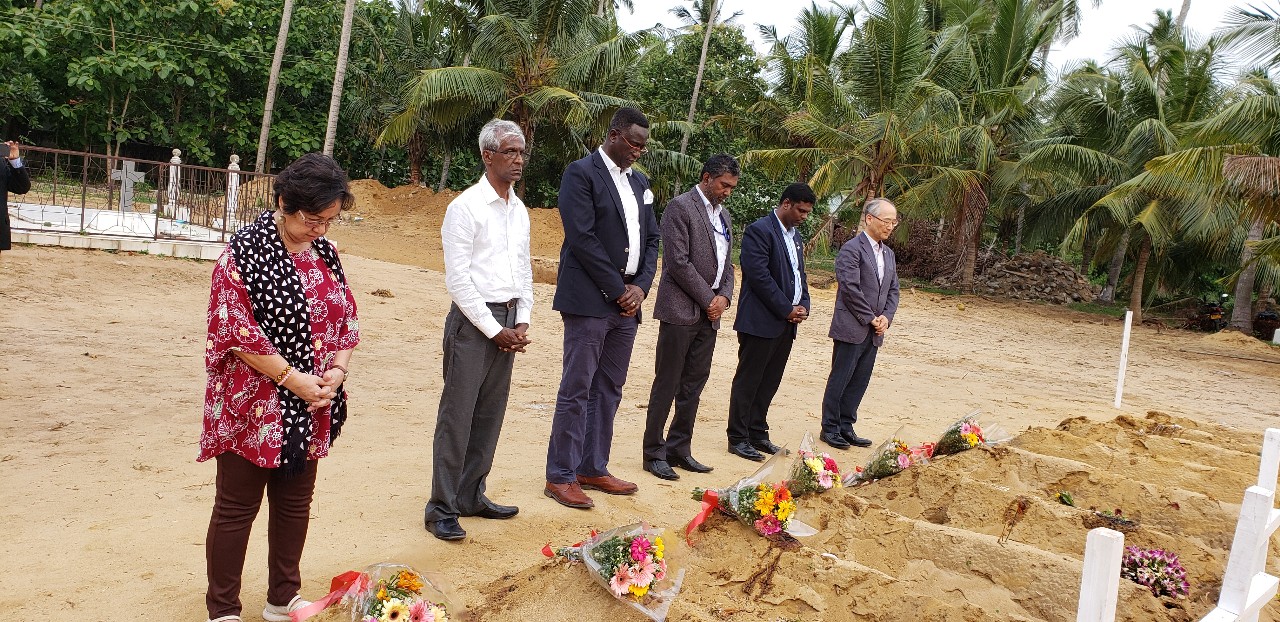
|
| ↑ Praying for the victims at a temporary graveyard of the church
|
Early morning next day, we flew to the YMCA of Batticaloa where one of the protestant churches was also brutally attacked by a suicide-bomber on the same Sunday. We first visited Batticaloa YMCA to express our solidarity to the YMCA members and staffs who are sincerely working for healing and supporting affected families in the community. We had an opportunity to see various programs/projects conducted by the Batticaloa YMCA for the community including working with Muslim communities around the YMCA. After having a nicely prepared lunch with the YMCA leaders of Batticaloa and nearby YMCAs, we visited Rev. Roshan Mahesan, paster of Zion Church Batticaloa, that was also attacked brutally on the same day. We heard his testimony of how painful to witness his church members have died and how much he is resolute before God to take care not only of the affected families but also of the whole congregation who are still suffering from the painful incident. We also expressed our deep condolence as well as sympathy and solidarity to the church and its congregation. Through our visit to three families, who lost their loved ones, we were once again reminded of the deep pain and suffering when peace was broken with whatever reasons. More importantly, we were reminded of the YMCA mission called by God to work for peace building and reconciliation among peoples to bring about lasting peace with justice. Before leaving Batticaloa, we had a press conference with local TV, radio and newspapers on how the world YMCA views the unforgettable incident and what the YMCA plans to put into action in terms of inter-faith dialogue and peace building amidst ongoing conflict and tensions.
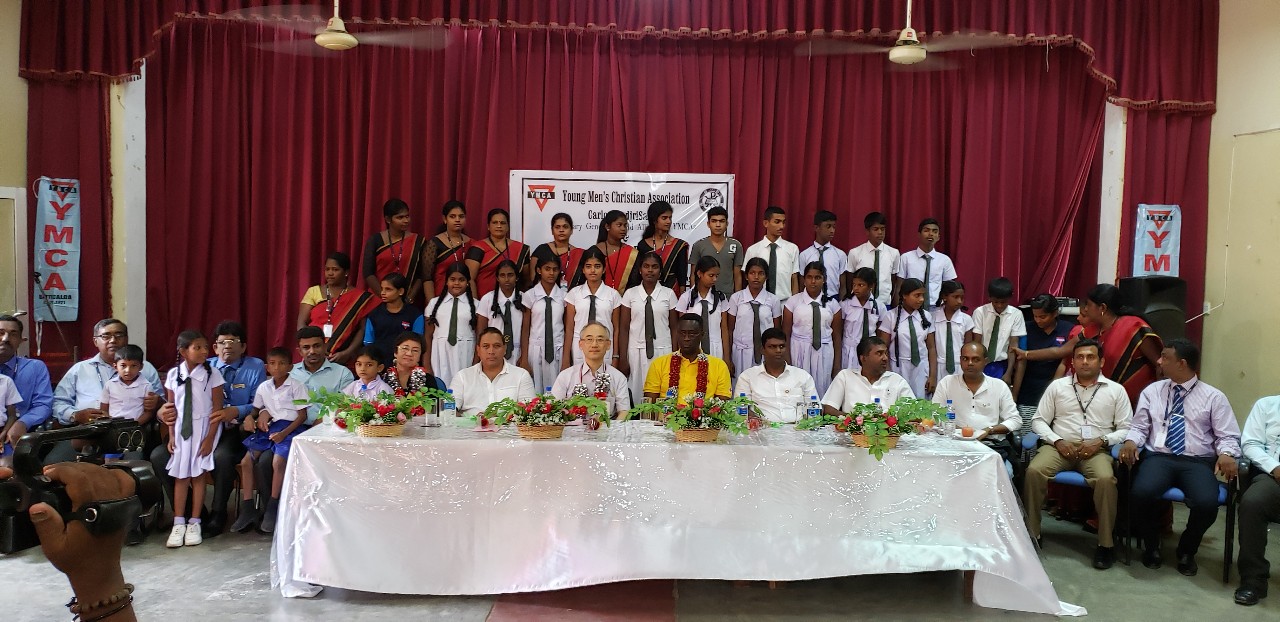 |
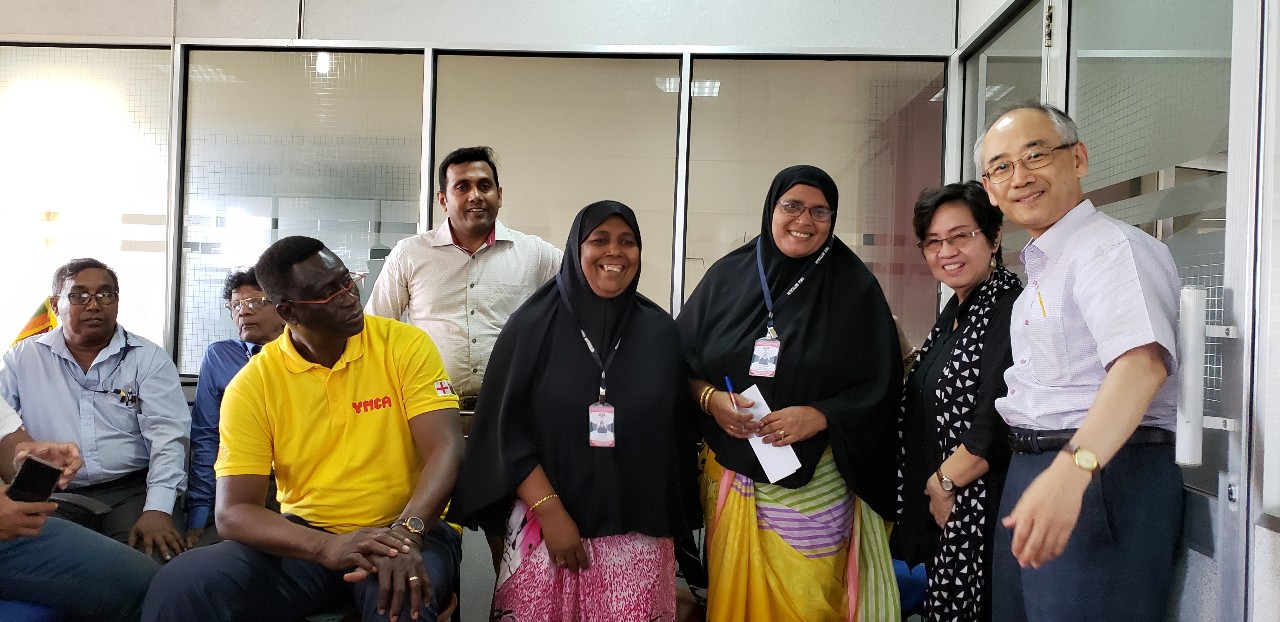 |
| ↑ Welcoming ceremony by the Batticaloa YMCA school for debt children
|
↑ Ballicaloa YMCA working together with Muslim staff on micro-credit programs for Muslim communities |
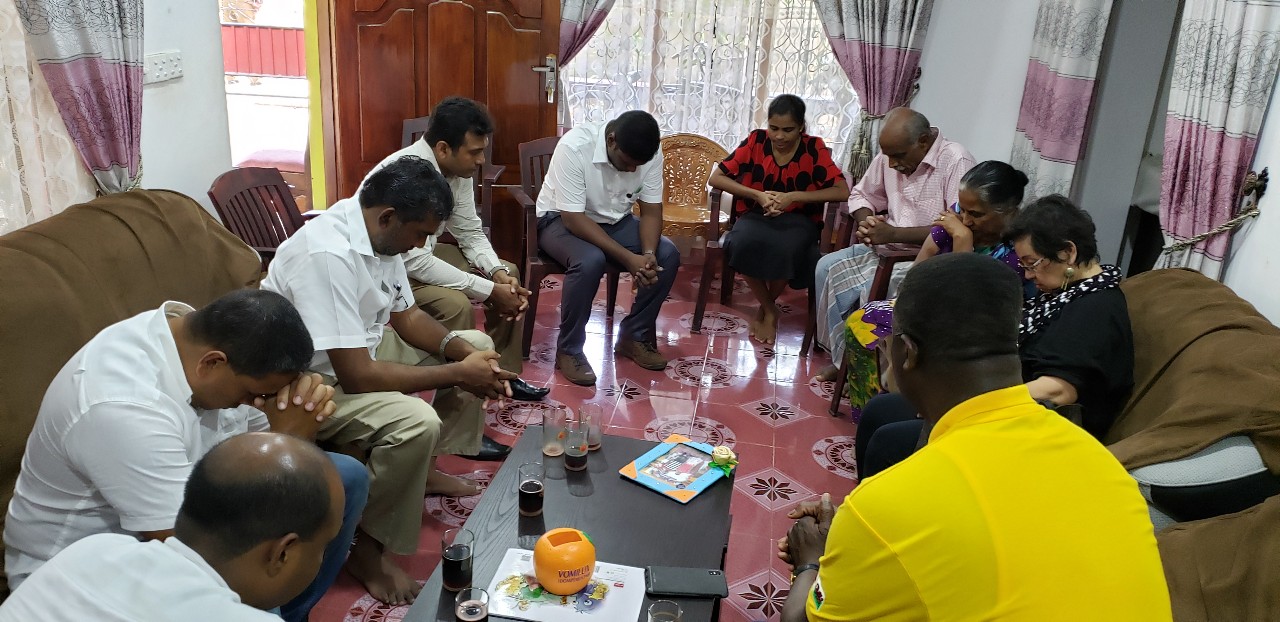 |
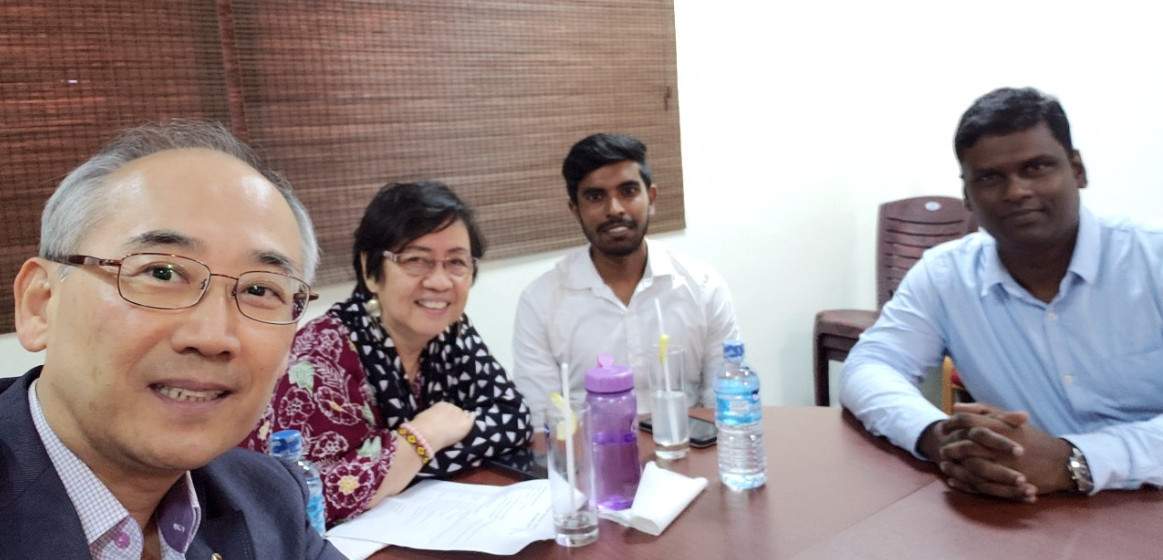
|
| ↑ Praying together for God's healing for remaining family members who lost four of their loved ones
|
↑ Dialogue with SOP alumnus and NGS Brownson for ICF planning
|
Upon our arrival at Colombo, we had a meeting with the key leaders of the YMCA including Executive Committee members, Presidents and General Secretaries from nearby local YMCAs. We discussed seriously how Sri Lanka YMCA can be united into one body so that it can serve its communities in a most relevant and meaningful way particularly when the missional work of the YMCA is so much needed to heal the deep wounds of its society as well as building a lasting peace among peoples with different religious beliefs. Finally, we deeply thank Sri Lanka YMCA, particularly the NCY-Sri Lanka and Batticaloa YMCA for all the hard work done for our visit. We will continue to pray God for the unity of your movement in Christ so that you are fully ready and willing to carry out the imminent mission of building peace with justice, as well as uniting your people towards more inclusive society.
~ Nam Boo Won, General Secretary
Babu Markus Gomes elected President of Bangladesh YMCAs
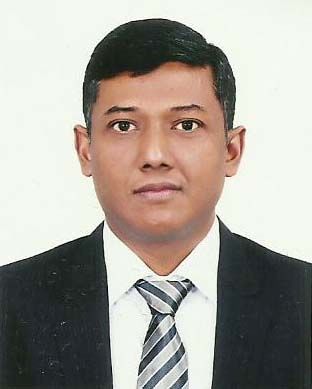 The 42nd Annual General Meeting of the National Council of YMCAs of Bangladesh was held successfully on 18th May 2019 at Birisiri YMCA in the district of Netrokona. Delegates from twelve local YMCAs of Bangladesh participated at the meeting. Soon after the holding of the Annual General Meeting, the election of the office bearers of the National Executive Committee was held at the same venue. Mr. Babu Markus Gomes, Representative of Savar YMCA has been elected as the new President of National Council of YMCAs of Bangladesh for the present tenure. The 42nd Annual General Meeting of the National Council of YMCAs of Bangladesh was held successfully on 18th May 2019 at Birisiri YMCA in the district of Netrokona. Delegates from twelve local YMCAs of Bangladesh participated at the meeting. Soon after the holding of the Annual General Meeting, the election of the office bearers of the National Executive Committee was held at the same venue. Mr. Babu Markus Gomes, Representative of Savar YMCA has been elected as the new President of National Council of YMCAs of Bangladesh for the present tenure.
Mr. Babu Markus Gomes started his journey in with Y movement in Bangladesh since he was a student of Jahangir Nagar University during late Eighties. In the past he also adorned the position of the President of NCY Bangladesh during the tenures of 1997-1998, 2000-2002, 2010-2012 and 2014-2015. He also holds the position of the President of APAY currently. We hope and pray the YMCA movement in Bangladesh will progress significantly under his dynamic leadership in the days to come.

GATN in Mongolia
Over the past years, the YMCA of Mongolia has been running numbers of programs and projects. One example is our Alternative Tourism program also known as GATN. This is a very unique program that promotes sustainable tourism which is eco-friendly and community centered. So far the YMCA of Mongolia has hosted teams from YMCAs of Taiwan, Singapore, and Hong Kong.
Mongolia has a very cold winter so we usually host our teams in the summertime. These trips usually last about 7 to 10 days. The GATN program encourages YMCA’s to get connected with their local communities. We are using this opportunities to extend our partnership with local communities and NGOs in Mongolia, the partnered communities are secondary schools, orphanage centers, and daycare centers. Visiting teams are sent to secondary schools to work with school children and run a different kind of programs aiming toward teaching children life skills such as handcraft, language, and music. Our hope is to empower young children through GATN program. Aside from working with children, we also plant trees to show our concern for the environment and climate change. Lastly, we do a small projects in the communities like setting up internet router, installing basketball rim in the outside basketball court and minor construction repairs. We want to be as impactful as possible to make a difference in the communities. We are reaching out to a wide range of people through GATN program. We would like to recognize our YMCA volunteers and partners that make this trip possible. Despite their busy schedule, our volunteers always take time to help us.
We host our fellow Taiwanese friends every summer during August. This time of year is a very pleasant time to come to Mongolia. The first part of this trip begins with visiting a secondary school in Tuv Aimag province which is about 100km from the Ulaanbaatar city. We have been working with this particular school over the past years. Our focus is to spend quality time with local school children. This is a good opportunity for children to engage in various activities because of summertime, they usually have more free time. We also dedicate one day for community service work at the school. Like cleaning the school area by picking up garbage. Our next destination was going to the homestay. This is a very fun way to experience nomadic culture with local people. Towards the end of the trip, we go to the national park “Terelj”, a favored destination for many. An exposure to beautiful nature in the national park while riding horses.
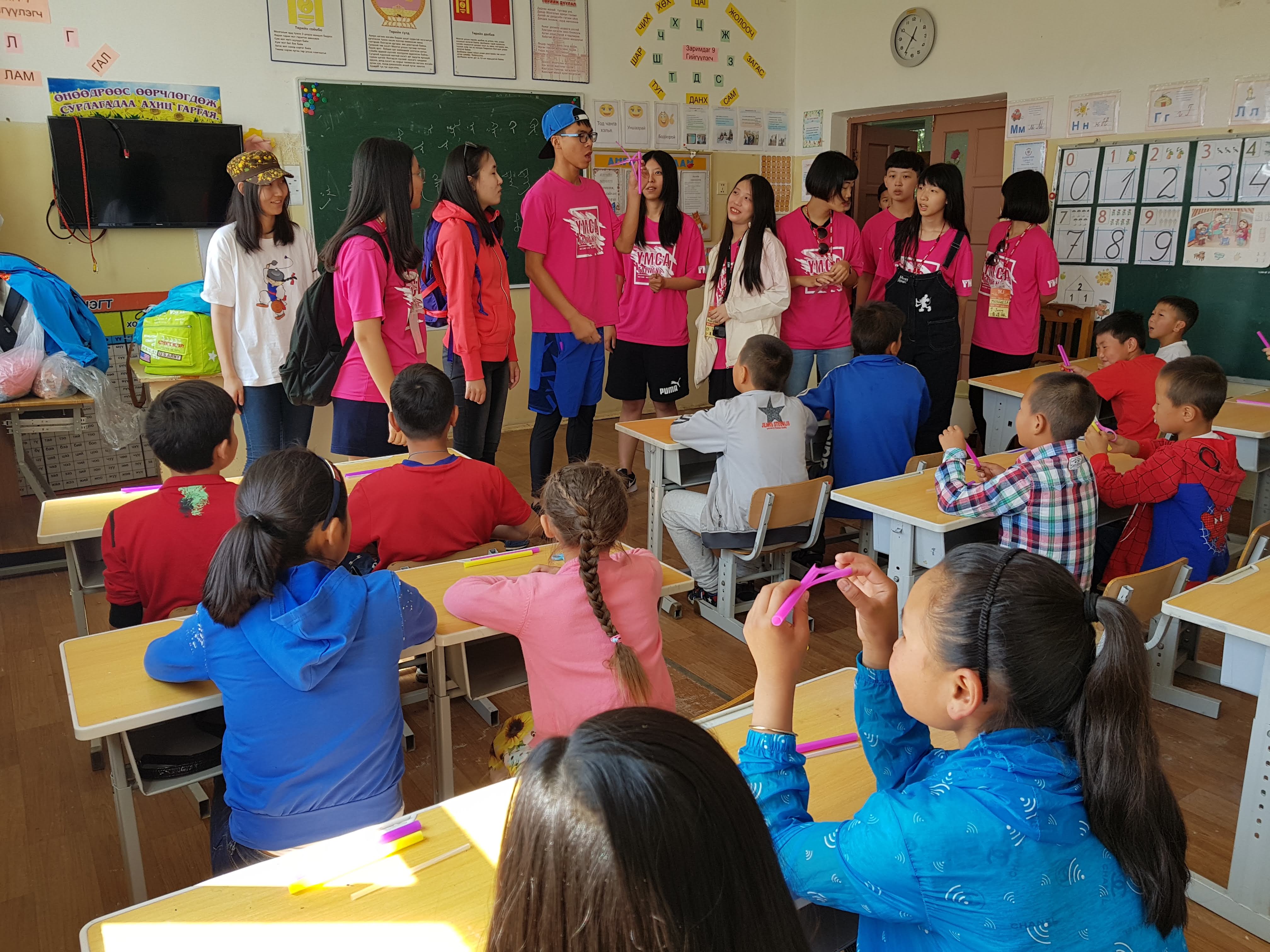 |
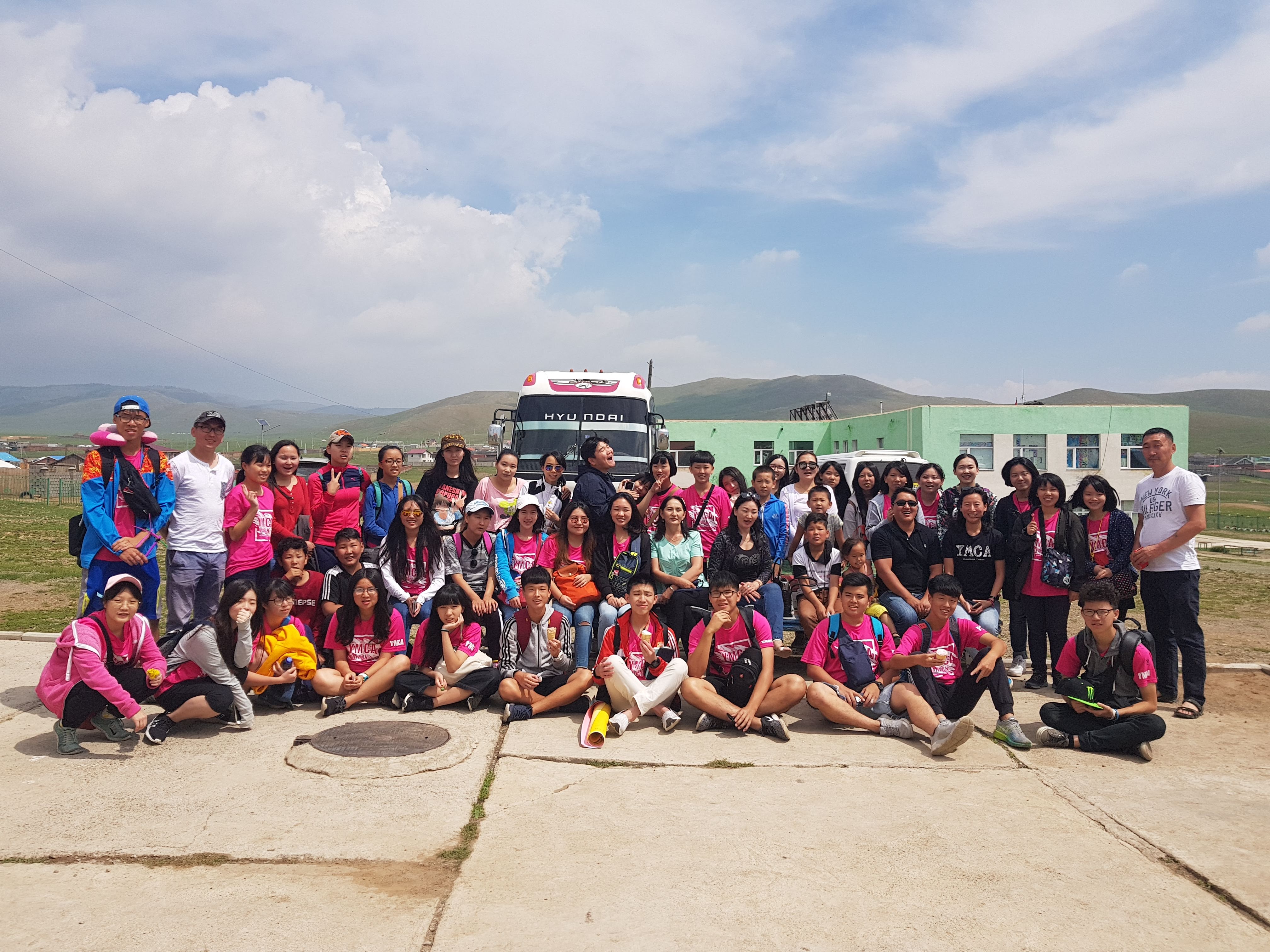 |
| ↑ Taichung YMCA Team visit secondary school
|
↑ Group Photo of Taichung YMCA Team & Mongolia YMCA staff
|
Our first winter team was from the Chinese YMCA of Hong Kong. Mongolia is known for its harsh cold winter. However, despite cold weather, the team decided to come to Mongolia and reach out to orphan children in the community. For some students, it was their first time to see snow and cold winter. The trip started with visiting an orphanage center where we spent quality time with children. The team came prepared to teach handcraft, cooking, and even martial arts. Children were so excited to learn. Our trip continued going to a ski resort where we had a lot of fun, skiing and sliding downhill with a sledge. Even though winter is freezing cold doesn’t mean we cannot have fun.
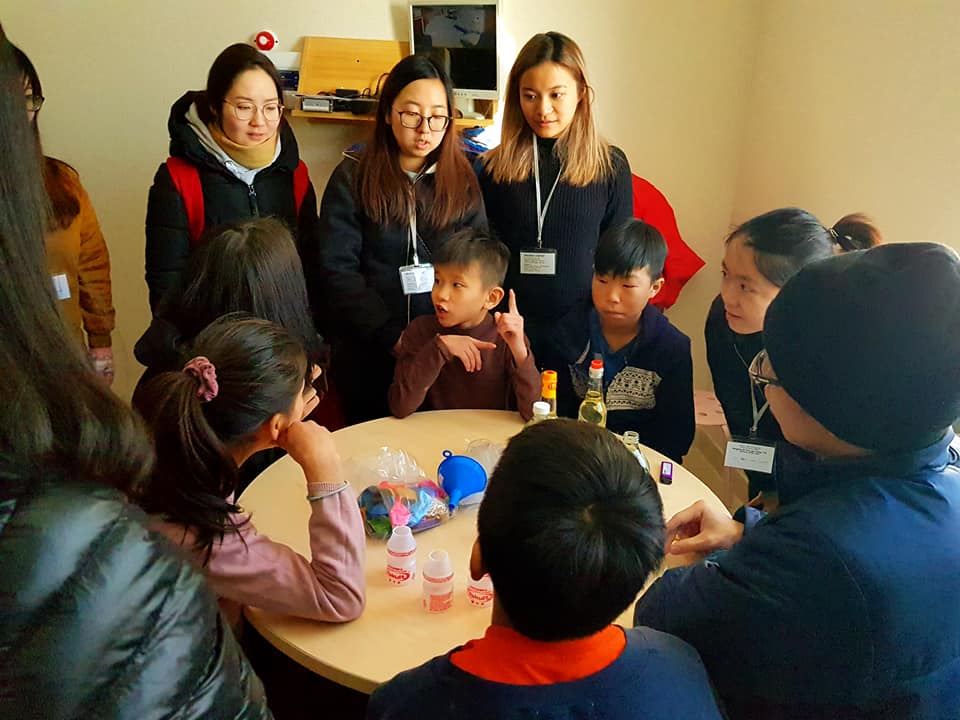 |
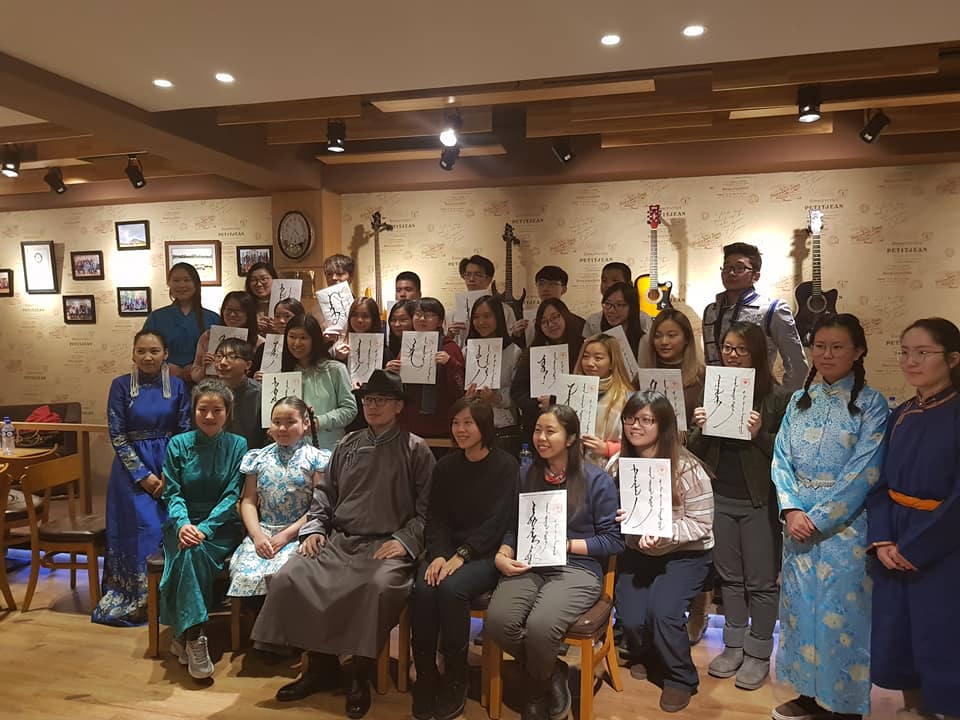 |
| ↑ Chinese YMCA of Hong Kong team visit Orphan Centre |
↑ Cultural Night at YMCA Coffee House
|
One of the main fun activity is a homestay. Homestay is a very fun way to experience the local lifestyle. Mongolia maintains its nomadic way of life and it is still a big part of Mongolian culture. Nomads primary job is taking care of their animals (horses, sheep, goats, cows, and camels). The fun part is that students get to help herders with their daily jobs like milking cow, tending sheep and goats and even making hand made dairy products. It is definitely one of the most memorable part of the journey. Staying at homes is an excellent way to experience a truly authentic way to experience nomadic life. Students get to spend a night in Mongolia traditional Ger/Yurt with. This is a fun and exotic experience for many. Those who are interested to visit Mongolia can contact Mr. Munktsog Davaadorj, General Secretary of YMCA of Mongolia could be contacted at email; tsogoosk@gmail.com.
~ Andrew Bat-Unur Erdenebayar,GATN Intern
|
